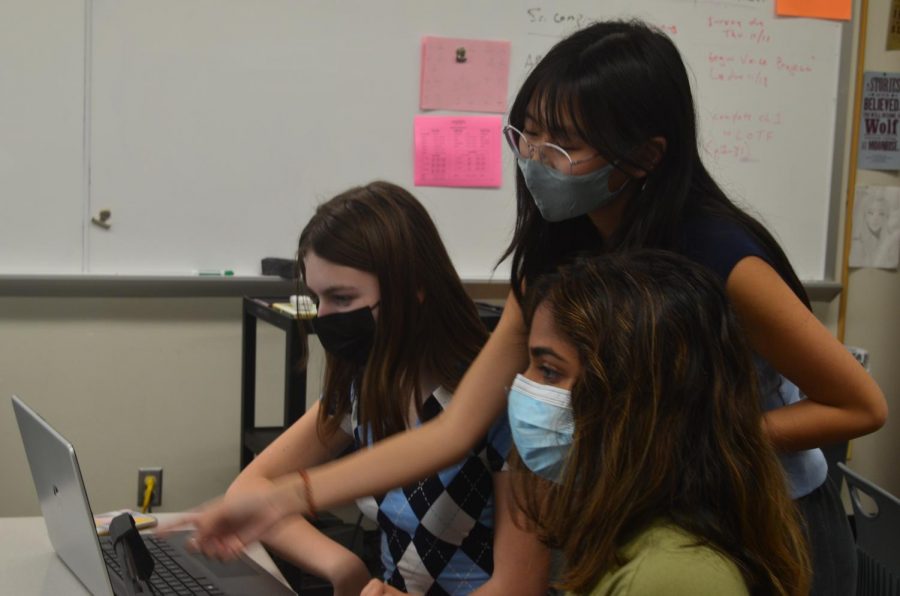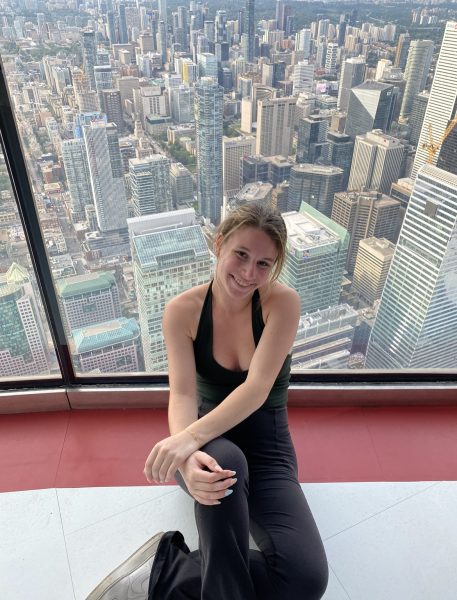Debating Through Life
How Speech and Debate skills will be brought into the real world
Public Forum co-captain Gina Hua (11) helps Varsity members Ava Hulse (10) and Ann Joseph (10) with their document on cryptocurrency for their upcoming tournament.
November 22, 2021
The Speech and Debate team at Parkway Central High diligently prepare for monthly debate tournaments. These preparations have helped with skills that can be used in everyday life outside of school. Doing research and learning speaking, reading, and listening skills to argue real-world topics is not confined to high school; Speech and Debate members know that they will be able to transfer debate topics and their dexterities into life after they graduate.
Speech and Debate, sponsored by English teacher Mattie Rudolph, is composed of three groups: Policy, Public Forum, and Public Speaking. They work together in their teams to argue a resolution about a topic, typically a current event, that is researched by the entire nation and then argued at tournaments.
Anusha Kathiravan, junior and Co-Captain for Public Forum, enjoys researching and arguing topics that not only pertain to our country, but world events that they might not otherwise get to learn about.
“We do all different policies, and it’s not just focused within the U.S.; it’s sometimes about the EU, the United States, and sometimes even we talk about Russia,” Kathiravan said. “You get exposed to these different topics that, when you’re older, you might need to know more about.”
Not only do they get to learn about interesting topics around the world, Speech and Debate members are picking up skills that are useful in the realm of debate tournaments as well as in the real world.
“Some skills you have to learn are, first of all, how to talk confidently and have good speech skills,” PUF member Anant Baghat (9) said. “I think another thing is being a good reader and having really fast comprehension because during debate, you’ll have to think of things on the spot and be able to come up with rebuttals during a part of the round called Crossfire, so it’s really important that you have really good speech and listening skills.”
There is also a lot that comes from the heart in Speech and Debate. Policy co-captain Nisha Murali (11) details that they are really learning how they want to make a difference in the world and what they care about most.
“Doing Speech and Debate, especially policy, builds up your compassion for other people because you look at this one event and you have to see ‘How can it help people? How can it hurt people?’ And it forces you to consider things in the light of what’s best for people as a whole,” Murali said.
The research done through Speech and Debate can be a great way to find one’s place in the world and the things they really want to know more about. Public Speaking co-captain Gaaya Binoj notes how she has been able to greatly expand her knowledge about the world by just researching the policies given to the team.
“Before I joined debate, I couldn’t point to Saudi Arabia on a map. Now I know all about the conflict between Saudi Arabia and Iran, Saudi Arabian guest workers, the Saudi Arabian monarchy, etc,” Binoj (12) said. “When you learn more about the world, you learn what you care about; what matters to you and where you fit into the world.”
There are often policies and topics that don’t necessarily pertain to one’s life, but it is notable that some have been seen in action months after they’ve been debated in tournaments.
“[Debate] has a lot of life implications; last year we did mandatory minimums, and a week ago, California became the first state to abolish mandatory minimums,” Murali said. “So these are policies that the government might actually implement, and it puts a real world focus on it.”
Whether it’s Policy, Public Forum, or Public Speaking, members of Speech and Debate are constantly learning and finding out more about events that are surrounding us in everyday life in a way they likely would not otherwise have the opportunity to. As people, we are always wanting to learn more and adapt to our surroundings, and Debate is a great way to do that.
“I think the learning aspect is probably the most beneficial part of it because it’s a really nice thing to be able to learn so much about current events, especially things that are so vital to the world we live in,” Baghat said.


